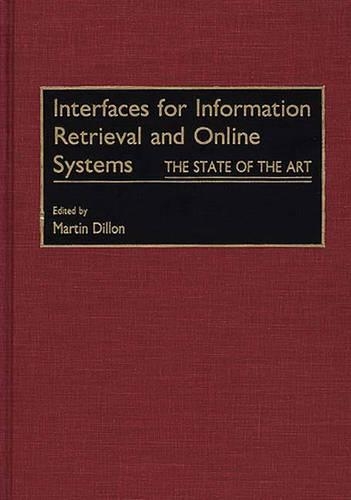
Interfaces for Information Retrieval and Online Systems: The State of the Art
(Hardback)
Publishing Details
Interfaces for Information Retrieval and Online Systems: The State of the Art
By (Author) Martin Dillon
Bloomsbury Publishing PLC
Praeger Publishers Inc
11th December 1991
United States
Classifications
Tertiary Education
Non Fiction
004.6
Physical Properties
Hardback
368
Description
Selected papers presented by leading professionals at a conference of the American Society for Information Science, along with additional commentary by guest editors comprise this volume, which condenses a broad range of information into a cohesive overview of the state of the art of interface design. The current status of human-computer interaction is examined, and major trends identified in an effort to project the future significance of interfaces to information retrieval systems. The need to establish and implement standards for design involving the redefinition of tools and the re-evaluation of information science theories and systems is central to the text, and the facts and data presented serve to initiate the development of these models. This compilation explores the present and the future of interface design from a variety of perspectives. The volume introduction reviews the highlights of the conference proceedings and is followed by a concentration on six major topics ranging from interface style to case studies and standards. Each chapter touches on some aspect of those factors which impact user interface design, and end of chapter bibliographies facilitate further study. In a field which is rapidly evolving, this work furnishes computer system developers and library and information science researchers with new insight into the potential for innovative computer design.
Reviews
Compiles 22 papers presented at a 1989 American Society for Information Science mid-year conference. They are organized in six sections: interface styles, artificial intelligence and the user interface, hyperdocuments, case studies in human-computer interaction, evaluation, and trends in technological standards. Each section starts with an introduction written by a guest editor. This compilation underscores the maturation of information retrieval systems--at last, the user is becoming the focus of these systems. The basic premise behind this book is that the currently prevalent command or menu-based user interfaces for retrieval systems, such as online public access catalogs, suffer from serious drawbacks and that they should be replaced by direct-manipulation user interfaces such as those of Macintosh computers. The problem in moving toward such direct-manipulation interfaces, as pointed out by one of the guest editors, is the lack of an agreed-upon metaphor for information retrieval systems. Exciting, user-centered work in the area of information retrieval. Recommended for library and information science collections, advanced undergraduate and up.-Choice
In his introduction, Martin Dillon notes that the primary question posed by the conference was "How can we give users the benefit of usability while also giving them the power and versatility of the new, modern systems" (p. xv). The papers assembled in this volume offer insights into how well existing interfaces accomplish this goal as well as examples of the research and development under way to improve the design of future interfaces.-HARDCOPY
"In his introduction, Martin Dillon notes that the primary question posed by the conference was "How can we give users the benefit of usability while also giving them the power and versatility of the new, modern systems" (p. xv). The papers assembled in this volume offer insights into how well existing interfaces accomplish this goal as well as examples of the research and development under way to improve the design of future interfaces."-HARDCOPY
"Compiles 22 papers presented at a 1989 American Society for Information Science mid-year conference. They are organized in six sections: interface styles, artificial intelligence and the user interface, hyperdocuments, case studies in human-computer interaction, evaluation, and trends in technological standards. Each section starts with an introduction written by a guest editor. This compilation underscores the maturation of information retrieval systems--at last, the user is becoming the focus of these systems. The basic premise behind this book is that the currently prevalent command or menu-based user interfaces for retrieval systems, such as online public access catalogs, suffer from serious drawbacks and that they should be replaced by direct-manipulation user interfaces such as those of Macintosh computers. The problem in moving toward such direct-manipulation interfaces, as pointed out by one of the guest editors, is the lack of an agreed-upon metaphor for information retrieval systems. Exciting, user-centered work in the area of information retrieval. Recommended for library and information science collections, advanced undergraduate and up."-Choice
Author Bio
MARTIN DILLON is Director of the Office of Research at the OCLC Online Computer Library Center, Inc., in Dublin, Ohio. An authority on retrieval systems interfaces, he has collaborated on papers presented at industry conferences.
